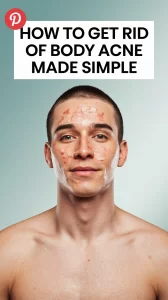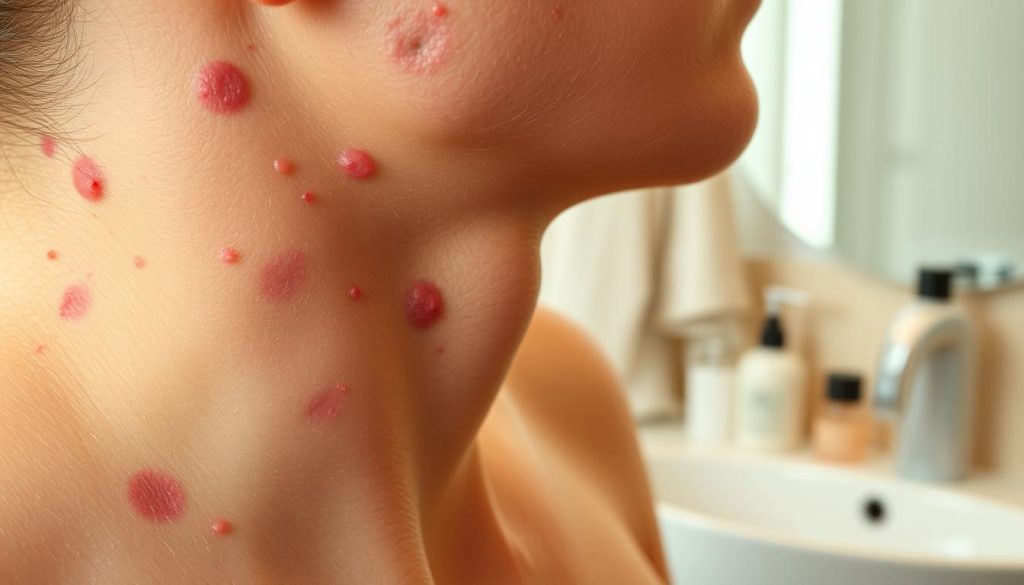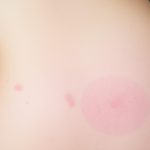Dealing with body acne can be really tough and hurt your confidence. But, there’s good news. You can get rid of body acne for good. This guide will show you how to do it.
You’ll learn about the causes and types of body acne. You’ll also find out how to clean your skin right and use the best treatments. You’ll get expert advice and easy steps to get clear, healthy skin all over.
Key Takeaways
- Understand the root causes and types of body acne to address the problem effectively
- Develop a customized cleansing routine to deeply purify and nourish your skin
- Explore over-the-counter and prescription acne treatments that target body breakouts
- Implement lifestyle changes to combat hormonal and environmental acne triggers
- Identify and manage specific areas of concern, such as back, chest, and shoulder acne
- Prevent future body acne outbreaks with proven prevention tips
- Seek professional help when necessary for persistent or severe body acne
Understanding Body Acne
Body acne is a common skin issue that affects many. It can range from mild blemishes to severe, cystic breakouts. Knowing the causes and types of body acne is key to managing and treating it.
Causes and Types of Body Acne
Excess oil, clogged pores, bacteria, and hormonal imbalances are the main causes of body acne. These factors lead to different types of body acne, such as:
- Whiteheads: Closed comedones that appear as small, white bumps on the skin’s surface.
- Blackheads: Open comedones that appear as dark, oxidized spots on the skin.
- Pustules: Inflamed, pus-filled lesions that resemble small, red pimples.
- Cystic acne: Deep, painful, and often large lesions that develop beneath the skin’s surface.
Differentiating Body Acne from Other Skin Conditions
Body acne is common, but it’s important to tell it apart from other skin issues. Some key differences include:
| Condition | Characteristics | Distinguishing Features |
|---|---|---|
| Body Acne | Excess oil, clogged pores, and bacterial overgrowth | Presence of comedones (blackheads and whiteheads), pustules, and cystic lesions |
| Keratosis Pilaris | Rough, bumpy skin texture caused by buildup of keratin | Rough, sandpaper-like texture without visible inflammation or pus |
| Folliculitis | Inflammation of hair follicles, often caused by bacteria or fungi | Small, red bumps or pustules centered around hair follicles |
Knowing the exact skin condition is crucial for the right treatment. By understanding body acne’s causes and features, you can work towards clearer, healthier skin.
Cleansing Routine for Body Acne
Keeping a consistent body acne cleansing routine is key to fighting breakouts. Using the right products and techniques daily helps keep your skin clean and clear. This way, you can avoid the frustration of body acne.
Begin your routine with an effective body acne cleanser that targets breakouts. Look for cleansers with salicylic acid or benzoyl peroxide. These ingredients help unclog pores and reduce inflammation.
- Gently massage the cleanser onto your skin, focusing on areas prone to body acne, such as the back, chest, and shoulders.
- Rinse thoroughly with warm water to ensure all traces of the cleanser are removed.
- Opt for a soft, clean washcloth or your hands to avoid irritating your skin.
After cleansing, use a soft, clean towel to gently pat your skin dry. Avoid rubbing, as it can irritate your skin and worsen breakouts.
By sticking to a body acne cleansing routine, you’ll get clearer, healthier-looking skin. Remember, consistency is crucial. Make this a regular part of your daily self-care.
“Proper cleansing is the foundation for managing body acne. It’s essential to find the right products and techniques that work for your unique skin type.”
Effective Topical Treatments
Topical treatments are a strong tool against body acne. You can find many options, from over-the-counter to prescription-strength. They help you achieve clearer, healthier skin.
Over-the-Counter Acne Medications
OTC body acne treatments are easy to find and use. They often have benzoyl peroxide, salicylic acid, or retinoids. These ingredients help unclog pores, reduce inflammation, and stop bacteria.
Using these treatments daily can help with mild to moderate body acne.
Prescription Acne Treatments
For tough or severe body acne, you might need prescription treatments. Dermatologists can suggest stronger options like retinoids, antibiotics, or combinations. These topical acne solutions aim to tackle the problem at its source.
Whether you choose OTC or prescription over-the-counter body acne treatments or prescription body acne treatments, follow the instructions. It might take weeks to see results.
“Consistent use of the right topical treatments can make a significant difference in managing body acne.”
Lifestyle Changes to Combat Body Acne
Making certain lifestyle changes can greatly help with body acne. By adopting these habits to improve body acne and daily routines for clear skin, you can boost your skin health. This can also help reduce stubborn breakouts.
Managing stress is a key factor in tackling body acne. Stress can upset your body’s hormonal balance, causing more oil and clogged pores. Activities like meditation, yoga, or deep breathing can help calm your mind. This promotes healthier skin.
Also, your diet is crucial in lifestyle changes for body acne. Stay away from foods high in sugar, processed carbs, and unhealthy fats. These can cause inflammation and breakouts. Instead, eat more fruits, veggies, and lean proteins to feed your skin well.
Regular exercise is vital for a daily routine for clear skin. Exercise boosts blood flow, reduces stress, and helps get rid of toxins. All these help your skin stay healthy.
| Lifestyle Change | Benefits for Body Acne |
|---|---|
| Stress Management | Regulates hormonal balance and reduces inflammation |
| Healthy Diet | Provides essential nutrients and reduces inflammatory triggers |
| Regular Exercise | Improves blood circulation and toxin elimination |
By making these lifestyle changes, you can actively manage body acne. This way, you can achieve clearer, healthier skin.
Managing Body Acne Triggers
It’s important to know what causes body acne to manage it well. Stress, hormones, diet, and the environment all play big roles. Let’s look at how these factors affect body acne.
Stress and Hormonal Influences
Stress can mess with our hormones, leading to more oil and inflammation. This is bad news for body acne. When stressed, our bodies make more cortisol, which makes our oil glands work too hard.
Hormonal changes, like those during puberty or menstrual cycles, can also make body acne worse. Changes in hormones like testosterone and estrogen can cause more oil and inflammation.
Diet and Environmental Factors
What we eat and our environment can also affect body acne. Foods high in sugar, dairy, and processed oils can cause inflammation. This can lead to more breakouts.
Also, pollution, humidity, and harsh chemicals can irritate our skin. Eating well and avoiding these environmental stressors can help.
| Trigger | Impact on Body Acne | Mitigation Strategies |
|---|---|---|
| Stress | Increased cortisol production, leading to excess oil and inflammation | Practice stress-reducing activities, such as meditation, yoga, or exercise |
| Hormonal Fluctuations | Fluctuations in testosterone, estrogen, and other hormones can stimulate sebum production and inflammation | Consult a healthcare professional to address hormonal imbalances |
| Diet | High-glycemic foods, dairy, and processed oils can contribute to inflammation and breakouts | Adopt a balanced, nutrient-rich diet with whole, unprocessed foods |
| Environmental Factors | Pollution, humidity, and harsh chemicals can irritate the skin and exacerbate body acne | Minimize exposure to environmental stressors and use gentle, non-irritating skin care products |
By tackling these triggers, you can fight body acne and get clearer skin. It’s all about understanding and managing these factors.
Body Acne in Specific Areas
Body acne can show up in different places, but it’s especially tough on the back, chest, and shoulders. Knowing how acne acts in these spots is key to finding the right treatment.
Back Acne (Bacne)
Back acne, or “bacne,” is hard to deal with because it’s hard to see and clean. It’s caused by too much oil, clogged pores, and bacteria. Keeping your skin clean, using products that don’t clog pores, and using special treatments can help with back acne.
Chest and Shoulder Acne
Acne on the chest and shoulders is often caused by hormones, tight clothes, and rubbing from backpacks or sports gear. Using gentle cleansers, wearing clothes that breathe, and using spot treatments can help with chest acne and shoulder acne.
| Area | Causes | Treatment Approach |
|---|---|---|
| Back (Bacne) | – Excess oil production – Clogged pores – Bacteria buildup |
– Consistent cleansing – Non-comedogenic products – Targeted treatments |
| Chest | – Hormonal changes – Tight-fitting clothing – Friction from backpacks |
– Gentle cleansing – Moisture-wicking fabrics – Targeted spot treatments |
| Shoulders | – Hormonal changes – Tight-fitting clothing – Friction from sports equipment |
– Gentle cleansing – Moisture-wicking fabrics – Targeted spot treatments |
By understanding the special needs of back acne, chest acne, and shoulder acne, you can create a plan to fight body acne in these areas. This will help you get clearer, healthier skin.
Body Acne Prevention Tips
Keeping your skin clear and healthy is the main goal in fighting body acne. By being proactive, you can lower the chance of breakouts. This leads to smoother, brighter skin. Here are some tips and strategies to help you prevent body acne and keep your skin clear.
Establish a Consistent Skincare Routine
Creating a consistent, gentle skincare routine is key to preventing body acne. Make sure to include these steps in your daily skincare:
- Cleanse your skin twice a day with a non-irritating, oil-free cleanser to remove excess oil, dirt, and bacteria.
- Apply a lightweight, oil-free moisturizer to hydrate your skin without clogging pores.
- Use a salicylic acid-based exfoliating scrub or wash a few times per week to slough off dead skin cells and unclog pores.
Wear Breathable, Sweat-Wicking Fabrics
Choosing the right clothes is important for preventing body acne. Go for fabrics that breathe and wick away sweat, like moisture-wicking athletic wear or cotton-blend materials. Avoid tight, non-breathable clothes that can trap moisture and bacteria against your skin.
Manage Stress and Hormonal Fluctuations
Stress and hormonal changes can trigger body acne. Try stress-reducing activities like meditation, yoga, or regular exercise. Also, talk to a healthcare professional if you think hormonal imbalances are causing your body acne.
| Tip | Description |
|---|---|
| Maintain Proper Hygiene | Shower regularly, especially after sweating, and change out of damp or dirty clothing as soon as possible to prevent bacteria buildup. |
| Avoid Irritating Products | Stay away from harsh, drying products that can strip your skin and make body acne worse. Choose gentle, non-comedogenic products instead. |
| Monitor Your Diet | Some studies suggest that certain foods, like high-glycemic ones, may cause body acne. Watch how your skin reacts to different foods. |
By following these body acne prevention tips, you can lower the chance of future breakouts. Remember, being consistent and patient is crucial in managing and preventing body acne and maintaining clear skin.
When to Seek Professional Help
Many cases of body acne can be handled with good skincare and over-the-counter treatments. But, sometimes you might need a dermatologist’s help. When should you think about seeing a professional for your body acne?
- If your body acne
- If your body acne is severe, with large, painful cysts or nodules
- If your body acne doesn’t respond to over-the-counter medications or home treatments
- If your body acne is causing scarring or significant emotional distress
A dermatologist can offer special treatments for severe body acne that won’t go away. They might give you stronger topical medications, oral antibiotics, or other therapies. With their help, you can get the treatment for body acne you need for clearer, healthier-looking skin.
It’s always best to get professional help early, rather than waiting until your body acne gets out of control. Don’t wait to make an appointment with a dermatologist if your skin concerns keep getting worse. With the right treatment for severe body acne, you can feel confident and have the clear, radiant skin you want.
Body Acne
Dealing with body acne can seem tough, but we’re here to help. This guide will give you the key info you need to fight this common skin issue. We’ll cover causes, treatments, and more to help you get clear, healthy skin.
Causes and Types of Body Acne
Body acne comes from many things like hormonal changes, too much oil, bacteria, and clogged pores. It can show up as blackheads, whiteheads, pimples, or cysts. Knowing what causes your acne is the first step to treating it.
Effective Treatments for Body Acne
There are many ways to fight body acne, no matter where it is. We’ll look at both over-the-counter and prescription treatments. You’ll learn the best ways to clear your skin.
Lifestyle Factors and Body Acne
Your daily life and surroundings can affect your acne. We’ll talk about how stress, diet, and other lifestyle choices impact your skin. You’ll get tips to manage your body acne better.
By the end of this guide, you’ll know more about body acne overview and how to fight it. Remember, everyone’s skin is different. If you need specific advice, talk to a dermatologist.
“Addressing body acne requires a holistic approach, focusing on both topical treatments and lifestyle modifications to achieve long-lasting results.”
Conclusion
Dealing with body acne needs a full and active plan. Knowing the causes, using good cleaning habits, and trying specific treatments helps. Also, making healthy lifestyle choices is key to clear skin.
Body acne is common but can be managed well. Stick to your skincare routine, watch out for what makes it worse, and get help if you need it. With effort and time, you can beat body acne and feel confident with your skin.
Keep working towards better skin, remembering the main points from this guide. Clean well, try effective treatments, change your lifestyle, and tackle the reasons behind your acne. These steps will help you get clearer, brighter skin.
FAQ
What are the common causes of body acne?
Body acne can come from many sources. Hormonal changes, too much oil, and bacteria are common culprits. Also, environmental factors like humidity, sweat, and friction play a role.
How can I effectively cleanse my skin to combat body acne?
Start with a daily cleansing routine. Use gentle, oil-free cleansers and exfoliate regularly. Showers after sweating are key. Also, use clean towels and clothes to avoid bacteria spread.
What over-the-counter and prescription treatments are available for body acne?
For mild to moderate acne, try over-the-counter products with benzoyl peroxide, salicylic acid, or retinoids. For severe cases, a dermatologist can prescribe stronger treatments.
How can lifestyle changes impact body acne?
Better habits can help a lot. Manage stress, eat well, and exercise often. These actions can greatly improve your skin and reduce acne.
How do I identify and address specific body acne triggers?
Look for common triggers like hormonal changes, stress, certain foods, and environmental factors. Keep a skincare journal and talk to a dermatologist to find your triggers and create a plan.
What are some tips for preventing body acne in specific areas, such as the back, chest, and shoulders?
For back acne, use a soft-bristle brush and rinse well after washing. For chest and shoulder acne, wear loose clothes and ensure good airflow. Use spot treatments and non-comedogenic products in these areas.
When should I seek professional help for my body acne?
If your acne is severe, doesn’t get better with over-the-counter treatments, see a dermatologist. They can give you a detailed check-up, stronger meds, and a custom treatment plan.




